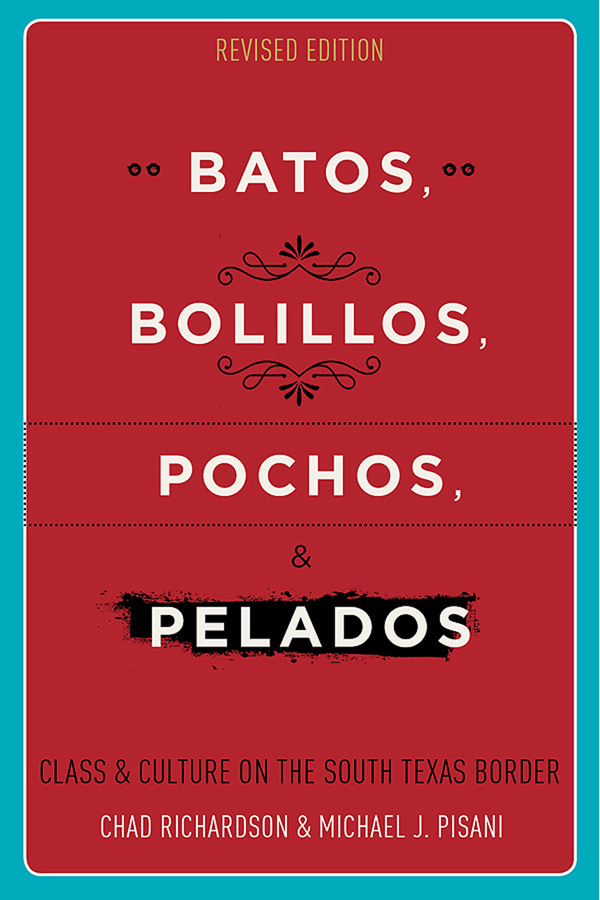- La Feria Community Holds Succesful Business Mixer Event
- Little Nashville to Take Place in Downtown Mercedes
- Lions Basketball Captures District Gold
- La Feria ISD Students Compete in Regional Chess Tournament
- Lions End First Half of 32-4A on a High Note
- La Feria ISD Held Another Successful Parent Conference
- Strong Appearance for Lions at Hidalgo Power Meet
- LFECHS Students Get to Meet Local Actress
- Students Participate in Marine Biology Camp
- Two LFECHS Students Qualify for All-State Band
Richardson, UTRGV Professor Emeritus, Republishes Popular Book ‘Batos, Bolillos, Pochos & Pelados’
- Updated: February 23, 2018
by J. Edward Moreno

Dr. Chad Richardson, UTRGV Professor Emeritus, has republished “Batos, Bolillos, Pochos, & Pelados,” a popular book that addresses unique social inequalities in the Rio Grande Valley and how they affect the population in terms of education and mobility. The book, co-authored with Michael J. Pisani, a professor of International Business at Central Michigan University, originally was published in 1999. The current reprinting with the University of Texas Press, encompasses data and demographics that have changed in the 18 years since its first printing. Courtesy Photo
RIO GRANDE VALLEY, TEXAS – UTRGV Professor Emeritus Dr. Chad Richardson has republished a popular book, co-authored with Michael J. Pisani, titled “Batos, Bolillos, Pochos, & Pelados.”
The book, originally printed in 1999, addresses unique social inequalities in the Rio Grande Valley and how they affect the population in terms of education and mobility. Pisani, a professor of International Business at Central Michigan University, focuses on cross-border business development, specifically on the U.S.-Mexico border.
The book was republished by the University of Texas Press in 2017 to encompass data and demographics that have changed in the 18 years since its first printing.
UTRGV News and Internal Communications sat down with Richardson, a former sociology professor at UTPA, to discuss his research and the importance of keeping this book current.
Q: Tell us about yourself and your research
A: I love teaching because it is highly rewarding. It provides an enduring sense of accomplishment, a pleasurable daily activity, and the opportunity to teach and discover knowledge. Teaching, especially at the college level, is a highly creative endeavor that provides its own rewards. Still, the greatest enjoyment often comes from leading students to discover their own talents for learning, understanding and creating knowledge.
One of the most enjoyable teaching opportunities I ever had was teaching adult dropouts the basics needed for literacy and for a GED. I could help them discover abilities they had come to believe they didn’t possess. It was also great fun to help them learn how to learn, and to see that learning was enjoyable. I became a college teacher in a predominantly minority university because the university environment provided ample room for creativity in teaching, and because I could see the same lights come on that I had experienced in teaching adult basic education.
Q: What are the main objectives of your book?
A: First, we wanted to describe how Anglo dominance in South Texas and throughout the United States evolved from the extreme racism and exploitation of earlier times, to the far less obvious forms of cultural and structural bias that perpetuate inequality today.
Second, we wanted to show that South Texas residents are amazingly resilient in the face of intense poverty, and are highly adept at leveraging their situation – social relationships, connections to family and community, even their proximity to the U.S.-Mexico border – to overcome deficits.
A third aim has been to let the people of South Texas tell their own story – and by so doing, help us understand their life situations and the innovative ways they find to deal with difficulties.
Another objective was to provide scholars and policymakers, particularly those from outside the region, a better understanding of and appreciation for the uniqueness of the South Texas borderlands and its commonalities with (and importance to) the rest of the U.S.-Mexico borderlands.
Lastly, we strove to help the reader become familiar with and understand what we call the sociological perspective – a perspective shared by many of the other social sciences. The first aspect of this perspective is the importance of ‘the power of the social situation,’ or the idea that the way we ‘structure’ social situations can have a powerful impact on human behavior. The second aspect, ‘the power of the definition of the situation,’ helps explain how our collective definitions (interpretations) of a situation likewise powerfully affects our behavior.
Q: What has been the impact of gathering information for this book?
A: Most UTRGV students are minority students, with more than 80 percent of Mexican origin, and have a rich cultural background in the Texas-Mexico borderlands. Many are the first in the family to attend a university. And many come to the university lacking the basic skills needed for college, but are surrounded by issues of intense academic significance. I am fascinated by these issues and find that our students can outperform even highly trained interviewers in getting people in their communities to share their experiences. When this student research is published, it validates the lives they document and gives the student interviewers a sense of cultural and historical place.
The ethnographic accounts, when published, also give academic validation that can also be used in academic publications and in teaching sociological concepts. Using the results of student research in the classroom allows me to arouse curiosity, challenge unexamined assumptions, and provide a safe environment where students can try, fail, get feedback, and get up to try again.
Many have commented that the research they conducted was the most rewarding aspect of the class. Others stressed how the interviews allowed them to see friends and family members in a more understanding light. Finally, publishing the work of several hundred students who voluntarily included their work in this, and the three other books published by the University of Texas Press, gives students a sense of accomplishment. Most become very excited at the prospect of not only being consumers of knowledge, the usual role of students, but also being very capable producers of knowledge in a way that is both locally and nationally recognized.
ABOUT UTRGV
The University of Texas Rio Grande Valley (UTRGV) was created by the Texas Legislature in 2013 as the first major public university of the 21st century in Texas. This transformative initiative provided the opportunity to expand educational opportunities in the Rio Grande Valley, including a new School of Medicine, and made it possible for residents of the region to benefit from the Permanent University Fund – a public endowment contributing support to the University of Texas System and other institutions.
UTRGV has campuses and off-campus research and teaching sites throughout the Rio Grande Valley including in Boca Chica Beach, Brownsville (formerly The University of Texas at Brownsville campus), Edinburg (formerly The University of Texas-Pan American campus), Harlingen, McAllen, Port Isabel, Rio Grande City, and South Padre Island. UTRGV, a comprehensive academic institution, enrolled its first class in the fall of 2015, and the School of Medicine welcomed its first class in the summer of 2016.



